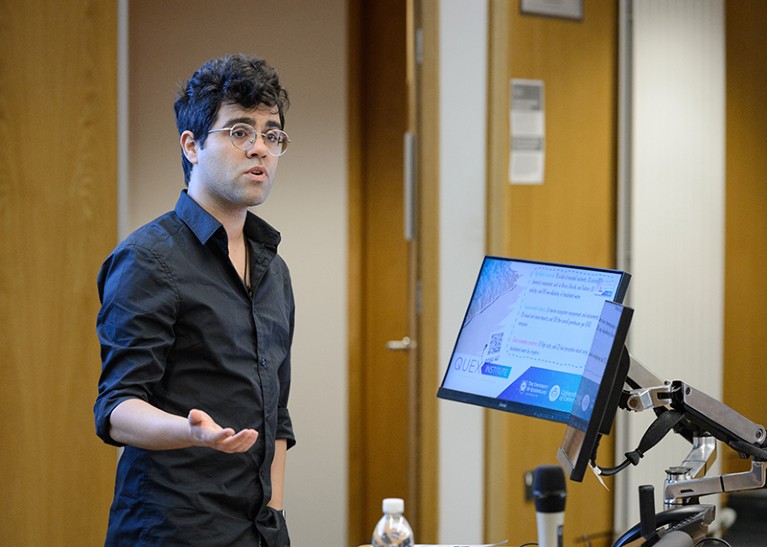
Babak Zolghadr-Asli drafted an angry response to one paper reviewer, seeing critiques as an opportunity to defend his work.Credit: SilviaJansen/Getty
After completing my master’s degree in water engineering at the University of Tehran in February 2017, I immediately began working as a research assistant at the same institution. By then, I had already co-authored several papers as part of my degree, and was riding high on my success.
I’d submitted my latest project for publication in one of the most prestigious technical journals in my field, which encompasses the design and management of water-related infrastructure. After several months, my three colleagues and I heard that the first round of review was finally over. From what I could gather, our paper had been well received, and everyone seemed to be on board — except for one reviewer, who took issue with one aspect of our project.
Their comments would, in the long run, improve my work. But the reviewer also unknowingly taught me one of the most impactful lessons of my career: I learnt more about navigating the academic world from them than I have from any textbook.
When I opened the e-mail from the editor, I scanned the reviewers’ comments, convinced that I had everything under control. The concerns seemed minor. One reviewer praised our methodology; another had a few constructive suggestions. And then there was Reviewer #2. Their concerns centred on a specific, technical part of the paper.
I had thought that I was perfectly open to revising my work on the basis of such feedback. But something about this particular comment got under my skin. Maybe it was the reviewer’s tone, or maybe it was because the comment seemed to nitpick about something I saw as peripheral, while ignoring what I thought were the paper’s real contributions. After months of work, being asked to make what felt like trivial, even unnecessary changes hit a nerve. My ego got the better of me.
Frustrated but determined, I drafted a response. I saw this as an opportunity to firmly defend our work. I crafted a lengthy technical reply but, in retrospect, my tone was anything but constructive. I was dismissive and left little room for discussion. I was pushing back — not with reasoned debate, but with a defensive stance that might have come off as arrogant, or even aggressive.
I sent it to my co-authors, expecting minimal feedback. Instead, one of them replied almost immediately with a simple note: “This has a harsh tone. Please consider dialling it down.”
I revisited the letter, but I couldn’t see the problem. I defended my stance to my supervisor, arguing that the reviewer had misunderstood key points and that my rebuttal was justified. My supervisor listened patiently before saying something I will never forget: “I don’t agree with how you’re making your argument, but if this is what you truly believe, we’ll go with it. But I want you to remember this moment and reflect on it once everything is said and done.”

Babak Zolghadr-Asli works in water engineering at the University of Queensland in Brisbane, Australia.Credit: Theo Moye
I made only minor changes to the response, and uploaded it to the peer-review portal.
A few weeks later, the decision came in: another round of suggested revisions. Reviewer #2 was still unsatisfied. Determined to stand my ground, I made only slight adjustments and resubmitted the paper. Then, the final decision arrived — and, perhaps unsurprisingly, the work was rejected.
I had been so fixated on ‘winning’ the argument that I had failed to recognize the value of being open to engaging with feedback — or the damage I would do by not entering into a constructive dialogue. If anything, my response had reinforced the reviewer’s resistance.


